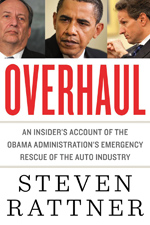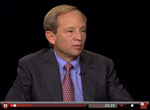Originally published in the Wall Street Journal
A few days ago, I ventured into the belly of the beast—a mostly male, mostly young, sweaty gathering of more than a thousand turbocharged, chest-thumping hedge fund investors.
The dozen orators at the Ira W. Sohn Investment Research Conference—a thoroughly estimable charitable event—chose an eclectic mix of topics. Some touted their pet stock ideas. Others deplored the dire straits of the United States and predicted economic Armageddon. All that separated some of these preachers from those on the televised Sunday morning revival meetings were periodic shouts of “Amen!”
I used my allotted 14 minutes on the stage at New York’s sleek Jazz at Lincoln Center auditorium differently. Drawing on my stint in the Obama administration, I tried to offer a perspective on why the president and his advisers made the policy decisions they did as they battled the worst economic and financial crisis in 70 years.
I flashed slides bubbling with wacky, heat-of-the-moment quotes from sages (including two Nobel Prize winners) to remind the audience of the administration’s wisdom in resisting the many calls for ill-advised, extreme actions such as nationalizing banks. Given my former role as lead adviser on autos, I zeroed in on the rescue of the car companies as an example of sensible policy. I noted the increasingly optimistic GDP estimates from one representative forecaster. And so on. A chilly breeze from the audience blew toward the podium.
I pivoted to my next point, trying to explain that the current hostility toward Wall Street on the part of the American citizenry was both deep and understandable. But my attempt to award the administration credit for trying to manage the anger by recalling President Obama’s remark a year ago to a gathering of bankers—”My administration is the only thing standing between you and the pitchforks”—was met with stony silence. By the time I arrived at a key slide—one that ascribed the current angry mood in part to record levels of income inequality in America—at least one in the crowd could take it no more and booed loudly.
I was dumbfounded. Was he seriously questioning my suggestion that 30,000 Americans should not command a full 6% of income in this country (a higher percentage than at even the end of the Roaring ’20s)? I blurted out the first words that came into my stunned head: “I hope you are kidding.”
Some in the audience applauded that remark but I couldn’t tell if they were putting their hands together for me or for the heckler. As my speech progressed, I concluded that perhaps the protester was taking exception to my praise for Mr. Obama’s balanced approach. Since returning to New York from the Auto Task Force, I have heard many financial types say that the president should have gone to the mat in defense of the banks.
Let’s get real. As a long-serving veteran of Wall Street, I’m in heated agreement that the financial industry is one of the greatest success stories in U.S. business history. The vast majority of the major investment banks, private equity firms and hedge funds in the world were created in America. In an era where the competitive edge of a developed country will increasingly need to be its brains rather than its brawn, financial services hold the promise of being one of America’s growth industries for the 21st century. It may not be quite God’s work, but having liquid and efficient capital markets is critical for any vibrant and growing economy.
But by conveying little sympathy for the many suffering Americans and brushing off responsibility for the excesses of the last bubble, Wall Street has managed to exacerbate the public anger, which in turn has been quickly transmitted to our elected officials in Washington. Chief executives can preach all they want about the need for courageous political leadership but the cold, hard reality is that no elected official—not even the president—could survive full-throated resistance to the current tsunami of populism.
As I left, one sympathizer offered reassurance: “They’re just angry because they haven’t made much money this year.” I thought about another of my slides, one that showed that income of the average American worker (after adjustment for inflation) was lower in 2008 (let alone 2009) than it was in 1999. How many of the attendees could say the same?


